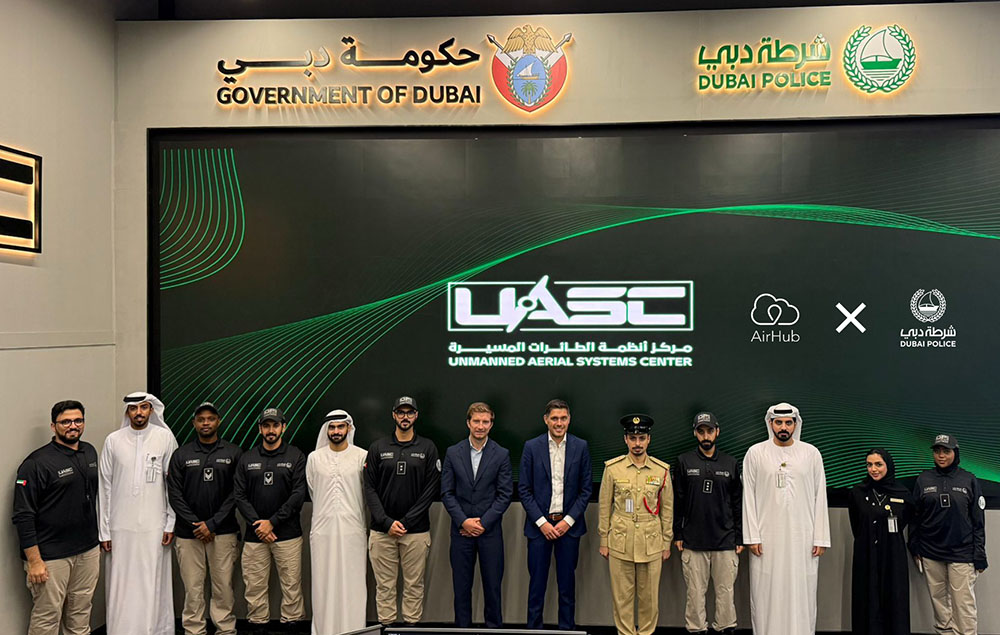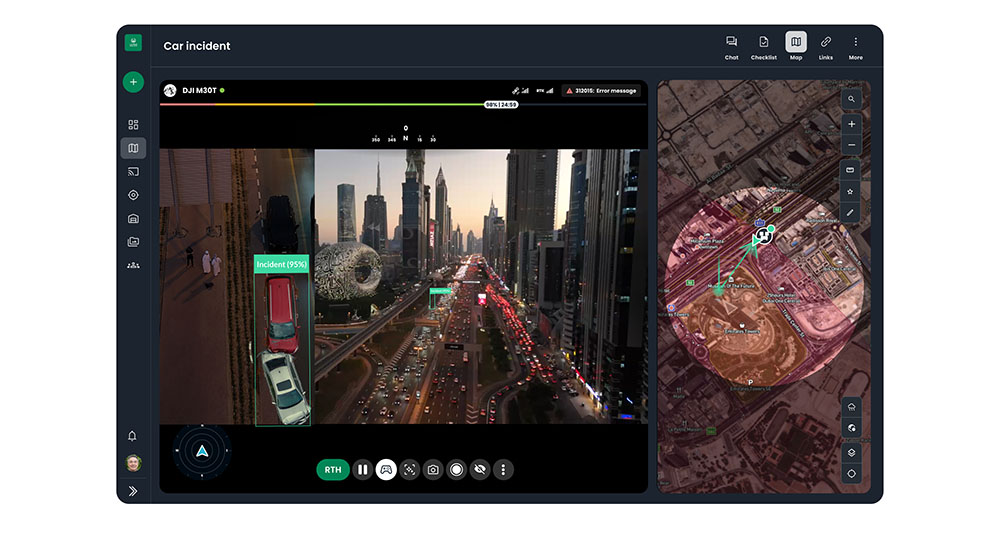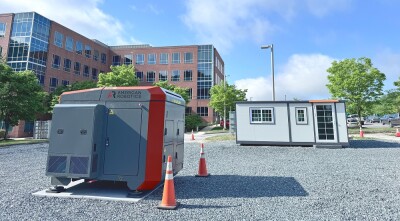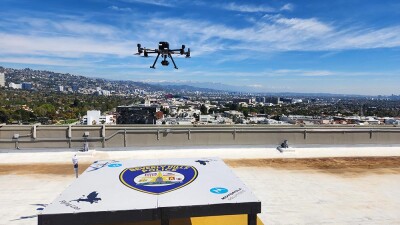We’ve detailed how Drone-as-a-First-Responder (DFR) programs are creating value all across the United States, with the technology being utilized by departments to increase response times, enable better officer safety and provide improved awareness in emergency situations. However, the benefits these programs can create aren’t limited to a single country, and recent news showcases how these innovations are making a difference across the world.
News broke last month that the Dubai Police have adopted AirHub's Drone Operations Center to streamline their drone operations that are currently playing a vital role in various policing tasks, including surveillance, traffic control, emergency handling, and crowd management. This is the exact kind of optimized integration AirHub is focused on enabling through its software and consulting services, which are designed to incorporate drones into daily operations. It’s a development that is set to not only bolster one of the region's most advanced DFR programs but also set a new standard for how others can successfully adopt and utilize drone technology.
To get a better understanding of exactly how the technology is making a difference for Dubai Police as well as what others can learn from it, we connected with Stephan van Vuren, CEO of AirHub. He provided detailed insights around the most critical elements of Dubai Police's DFR program, how AirHub can support integration challenges, what other public safety departments can learn from this news, and much more.

Jeremiah Karpowicz: This news is a significant development for the drone industry for several reasons, but what can you say about the mutual commitment to operational excellence in drone policing that defines this partnership? How essential is that as a baseline for success with the technology, regardless of location or size?

Stephan van Vuren: Operational excellence is what separates experimental drone programs from true mission-critical capabilities. The collaboration between Dubai Police and AirHub reflects that distinction and sets a new global benchmark.
Much like commercial aviation, where performance and safety depend on strict procedures, clear governance, skilled personnel, and coordinated operations, Dubai Police applies the same level of discipline to its drone operations. It is not just about hardware. It is about how drones are managed, how pilots are trained, how missions are coordinated, and how compliance and maintenance are continuously assured.
With AirHub’s Drone Operations Center, Dubai Police manages its drone fleet with the same level of control and oversight you would expect from a professional airline operation. Pilots are tracked and certified, flights are logged and reviewed, aircraft are maintained, and live coordination with ground teams and airspace authorities ensures every mission is integrated and safe.
This mindset is essential regardless of the size or location of the organization. Success with drone technology begins with structured processes, not just smart tools. That is the foundation for real impact in public safety.
What were some of the management and coordination challenges that the Dubai Police were facing with their use of drones that this partnership will help solve?
As Dubai Police expanded their drone operations, they encountered increasing complexity in managing teams, workflows, and equipment. Each mission involves coordination between pilots, payload operators, and observers, along with tracking drones, batteries, maintenance status, and support gear. They also needed to ensure proper flight logging, pilot training, and structured incident registration and follow-up.
The challenge extended beyond internal coordination. Drone teams had to collaborate with other departments within Dubai Police, such as the Incident Management Center, as well as external stakeholders including government agencies and air traffic control. Without an integrated system, these interactions risked delays, miscommunication, and inefficiencies.
AirHub’s Drone Operations Center solves this by bringing everything together in one unified workflow. All operational elements are accessible through a single user interface, removing the need for multiple disconnected tools. This simplifies daily operations and makes it easier to train and scale teams as the program grows. It ensures clarity, coordination, and complete situational control across the organization.
How will AirHub's Drone Operations Center integrate with Dubai Police's existing command and control infrastructure? And at a broader level, how does AirHub support integration challenges when they arise for end users?
AirHub’s platform is being integrated directly with Dubai Police’s existing Incident Management System, which handles incoming service calls, prioritization, and task assignment. By linking these systems, drone deployments become part of the standard response workflow. When a call comes in, the system can automatically select and launch the most suitable Drone-in-a-Box unit based on location, availability, and mission type.
AirHub is also integrating with other key systems used by Dubai Police, including drone hardware, counter-UAS solutions, and situational awareness platforms. The goal is to reduce the time between an incident report and drone arrival to under one minute. This is the foundation of a truly responsive Drone as a First Responder program.
Beyond that, our open API and custom integration capabilities allow us to connect to a wide range of third-party tools and data sources. When challenges arise, our development and support teams work closely with the client to deliver tailored, operationally sound integrations that fit into their existing infrastructure and workflows.
What features of AirHub's Drone Operations Center do you believe will be most critical to Dubai Police's DFR program?
The strength of AirHub’s platform lies in its unified approach. Dubai Police will benefit most from the combination of live operations features for situational awareness, comprehensive fleet and equipment management, and full compliance support. These are critical for maintaining oversight and control in high-pressure environments.
What makes the platform unique is the ability to operate drones directly from within the application itself. Whether using iOS, Android, DJI controllers, or remotely through the web-based Drone Operations Center, users can plan, launch, and monitor missions from one system. This removes the need for switching between multiple apps or interfaces and enables fast, coordinated response at scale.
For a Drone as a First Responder program, where speed and control are essential, this all-in-one capability is a key enabler of success.
What kind of training will Dubai Police personnel receive as a result of this partnership, either on a one-off or ongoing basis?
Training is a continuous process in this partnership. Dubai Police operates with hundreds of pilots, payload operators, and support staff, so our focus is on scalable and ongoing training programs tailored to evolving operational needs.
But the collaboration goes beyond training alone. We have established a joint development roadmap and actively work with Dubai Police to collect end-user feedback. This ensures the platform keeps improving in line with real-world requirements.
At the foundation of this approach is a shared vision between AirHub’s leadership and the captain overseeing drone operations at Dubai Police. Together, we are committed to building the most forward-leaning Drone as a First Responder program in the world. One that sets the standard not just for the region, but for public safety agencies globally.
Does your system allow the Dubai Police to make purposeful and community-focused decisions when it comes to how they approach data security and privacy for the sensitive information they might capture when using drones?
Yes, data security and privacy are integral to how our platform is set up and used by Dubai Police. We have implemented an on-premise installation, ensuring that all data is stored and processed within their own secure infrastructure. This gives Dubai Police full control over access, retention, and compliance with national regulations.
Our platform also includes a Secure Data Mode, which prevents data from going anywhere other than the servers of Dubai Police. This is especially important during sensitive operations where strict control over captured media is essential. In addition, we offer automated deletion settings that can remove images and video after a defined period or immediately after mission completion, depending on operational policy.
These features empower Dubai Police to make responsible, community-focused decisions about data use while maintaining the highest standards of security.
What can others learn from this news when it comes to how it might define new standards in using drones for public safety?
This collaboration shows what is possible when technology and operational discipline come together under a shared vision. Dubai Police is not just using drones—they are fully integrating them into their emergency response workflows, supported by a unified platform that manages everything from deployment to compliance.
Others can learn from their approach: success in public safety drone operations is not about isolated tools, but about building scalable systems that connect people, technology, and procedures. By focusing on interoperability, real-time coordination, and secure data management, Dubai Police is setting a new benchmark for how Drone as a First Responder programs should be designed and implemented.
This is not just a regional example. It is a blueprint for how agencies around the world can elevate their capabilities and redefine their operational readiness through drones.
If there's one piece of advice around how other departments like Dubai Police can similarly develop a DFR program of their own, or take their usage of the technology to the next level, what would it be?
Start with a clear operational vision and treat drones as an integrated part of your public safety infrastructure, not as a separate project or experiment. Build a foundation based on procedures, governance, and coordination, similar to how professional aviation or emergency services operate.
Choose a platform that supports scalability and allows for full integration with your existing command structures and frontline operations. Just as important, work with partners who understand both the technology and the operational demands of public safety teams.
Dubai Police succeeded because they combined ambition with structure. Their program was designed not just to fly drones, but to deliver fast, reliable, and secure situational awareness in real time. That mindset is what transforms a drone program into a true operational capability.















Comments